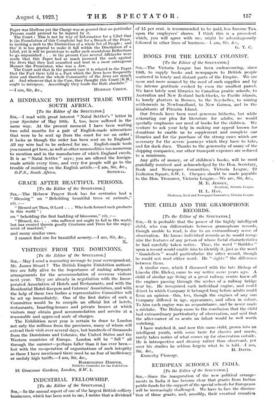THE CHILD AND THE GRAMOPHONE RECORDS.
[To the Editor of the SPECTATOR.] SIR,—It is probable that the power of the highly intelligent child, who can differentiate between gramophone records, though unable to read, is due to an extraordinary sense of observation. He knows individual records as he would recog- nize the features of any person of whose facial characteristics he had carefully taken notice. Thus, the word " Bubbles " upon a record would enable him to identify it, just as the word " Gondoliers " would particularize the other record, thought he could not read either word. Ile " sights " the difference between them.
A similar ease, which I discussed with the late Bishop of Lincoln (Dr. Hicks), came to my notice some years ago. A child of similar age living at a great railway centre knew all the engines passing through the arches of a railway bridge near by. He recognized each individual engine, and could detect to which Company it belonged long before adults could form an opinion—this, too, though the engines of any one Company differed in age, appearance, and often in colour. To him each engine was an acquaintance, and he never made a mistake. The Bishop came to the conclusion that the child had extraordinary particularity of observation, and said that the after-career of so acute an infant would be well worth watching.
I have watched it, and now this same child, grown into an intelligent youth, with sonic taste for classics and music, rarely takes notice of what comes up for observation outside. He is introspective and dreamy rather than observant, yet over his studies lie seldom forgets what he is told.—I am,


































 Previous page
Previous page